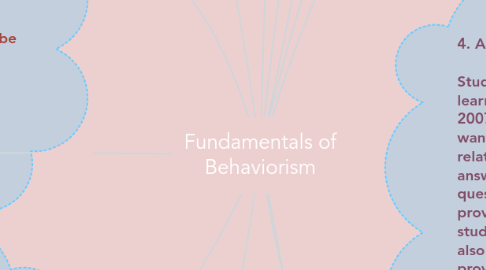Fundamentals of Behaviorism
by Carlos Anguiano

1. Moments of behaviorism
2. 7. Organize individual one-on-one meetings. Holding an individual meeting with each of the students (or in a small group) is one of the most effective means of providing feedback. Try to meet with a student while the others are working independently. Time the meetings to last between 5 or 10 minutes. Create an environment in which students can ask questions, feel comfortable expressing themselves. If the students have the attention and the opportunity to ask questions and the conversation is optimistic, the students will want a new feedback.
3. later its use is adapted to The education. It is the first theory that comes to influence how you see the learning. Its beginnings go back to the first decades of the twentieth century. Its object of study are the observable processes
4. In my person conclusion If we are open to it, we will learn many things about ourselves as educators. Remember that feedback goes both ways, and as teachers it is advisable to never stop improving and perfecting our skills. Just as we as education professionals, we must be trained in this subject, we must know that we are working with children and they have a family where they spend many hours.
5. General Figures representative ace
6. The observable changes at behavior, everything that can be measurable mental processes superiors, consider irrelevant
7. 6. Give feedback to keep students "online" with their achievement. A checklist of what you expect from them exposed in the classroom allows students to know how and where to go. Use the "4 questions" to guide your steps. Am I going in the right direction? What improvements can I make? What am I doing right? What is my general performance?
8. Roles of the actors major in learning
9. BEHAVIOR
10. J. B. Watson Pavlov Thorndike
11. 4. Ask the 4 questions. Studies on effective teaching and learning (Dinham, 2002, 2007a, 2007b) have shown that students want to know where they are in relation to their work. Providing answers to the following four questions regularly will help you provide quality comments for students. These four questions are also useful when feedback is provided to parents: What can the student do? What can not the student do? How does the student's work compare with that of others? How can the student do better? This is also useful in providing feedback to parents.
12. features essentials


